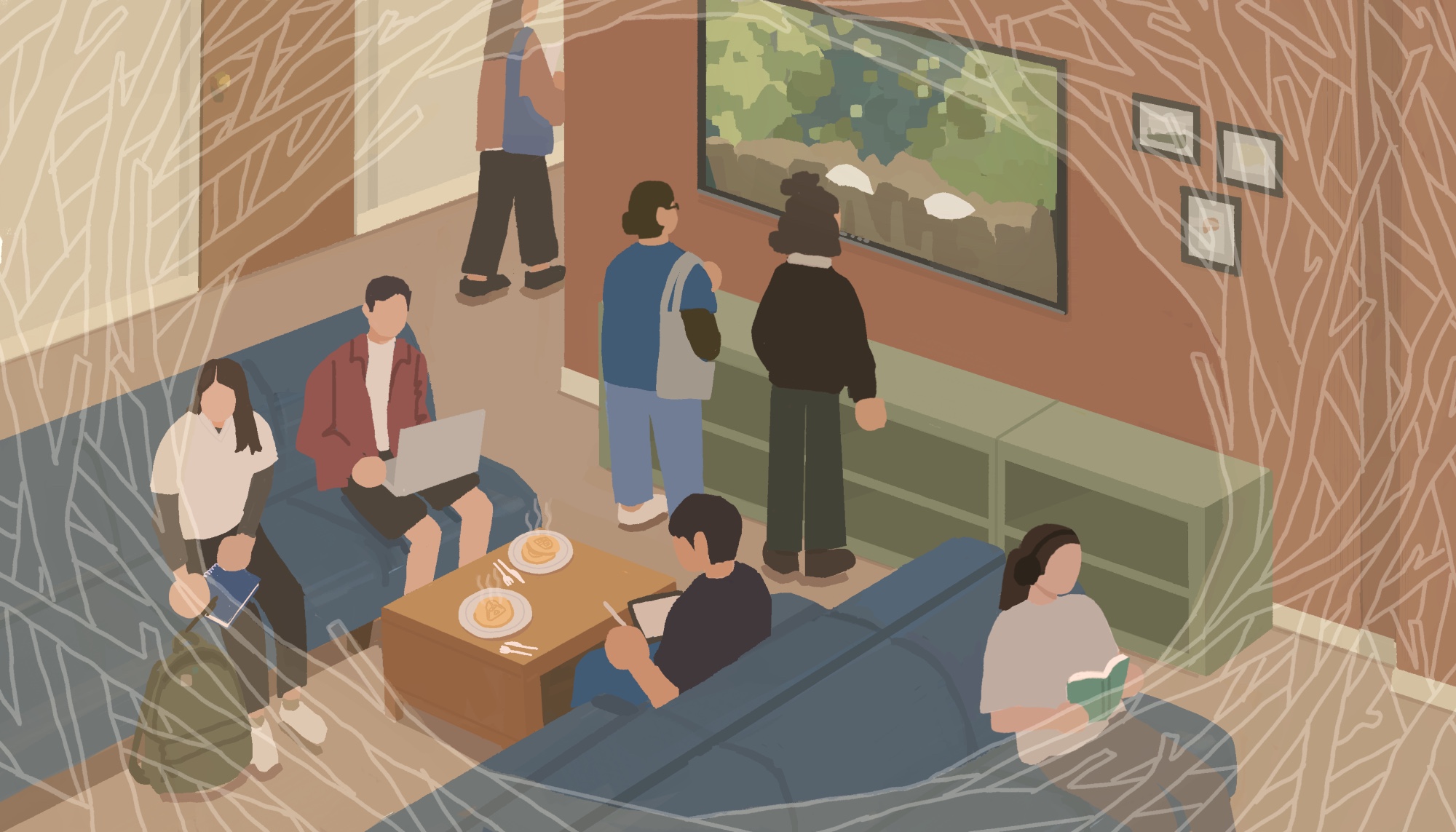
EMILY WHANG / NEXTGENRADIO
What does it mean to be
home?
Emma Hall speaks to Rene Chavez, a member of Cherokee Nation and a third year biology major who felt overwhelmed coming to the University of California, Davis from his small, rural town of Ukiah, California. Upon his arrival, Chavez found the Native Nest, a center for Indigenous students and a family among his peers.
Torn between worlds, a Cherokee student finds a true sense of home
LISTEN TO THE AUDIO STORY
Click here for audio transcript
[REPORTER]
I’m Emma Hall with Next Gen Radio Indigenous in Sacramento.
Going to a university can be a complicated and confusing process. It may seem hard to find a sense of belonging at first.
That’s how it was for Rene Chavez, a citizen of Cherokee Nation who is attending college in Northern California.
Eventually he did find that sense of community when he stumbled upon the Native Nest, a resource center for Indigenous students and where he now considers home.
[RENE]
To me, to be at home is a place where you can feel welcome, where you can be yourself, express yourself as you want to, and also have people around you that support you and encourage you in your endeavors and people that you can rely on to help you in that as well.”
My name is Rene Chavez. I’m a third year bio major here at UC Davis.
I’m from Ukiah. Which is 2 hours north of San Francisco.
Um, for me, coming from Ukiah, Davis felt very big.
I am mixed of Latino and Native descent. My dad is from El Salvador, my mom is Native and we are Cherokee and growing up, I definitely had to kind of pick between the two sides.
I struggled a little bit internally growing up, just feeling like, okay, do I have to pick a side? Am I more of this side or more on this one?
And so then once I got to high school, it became even a little more difficult for me because then they had like, there is Club Latino, and then there was the Native club there as well.
But I never could truly relate to either one of those groups. And so for me, I really struggled where to find a middle ground with that growing up.
Once I started my college career, I pretty much immediately began looking for some place where I could feel like I belonged or a safe place to be. And so I found that through The Nest.
So when we come to the university here where the Native community is not a very big space, there’s not a whole lot of us. So to have a group of people that support you and figure out what you’re doing is a very important detail.
We do have Waffle Wednesdays on the first Wednesday of every month and we’ll have breakfast, which is waffles. And like everyone comes together and we all talk and things like that.
There are Star Wars pancakes. And I love Star Wars.
On my birthday last year, for example, I, I got COVID right on the day of my birthday. And apparently, like some of my friends, actually, they were going to get a cake for me and everything, which I had no idea about. So like, that really was like, Oh, wow, okay, this is kind of like a little family for me here.
And just whenever, like, things have been down or if I’m down or I’m having issues with my classes, I know that people here, I can talk to them about it. They can give me support, or they can just tell me like what I need to do to fix it. I just know that here I’ll be okay and I’m allowed to talk to them about anything. And it just feels like a very comfortable space to do so.
Thankfully, when I was here and the more I interacted with the center I started to finally kind of feel a place at home or a place where I felt welcome. And that really did help me feel at ease on the campus and feel like I belonged here.
So I think in order to have a good community here to support you and to help you along your way is just instrumental to your success.
Rene Chavez has long struggled to gain a sense of belonging.
Chavez is a third-year biology major at the University of California, Davis. He’s a citizen of Cherokee Nation and grew up in Ukiah, a town in Northern California that’s surrounded by mountains and trees with a population of at least 16,000. He said after moving to the city of Davis, which is almost four times that size and flat in comparison, he didn’t know where to put himself.
“A lot of people who move here are from the city, but for me, it felt like a very big jump,” Chavez said.
Chavez arrived at Davis his second year to a student population of 40,000, after a year of attending remote classes by himself due to the COVID-19 quarantine. Even though he was an existing student, Chavez still felt like a small fish in a big pond. Many of his peers started up non-profits. And while he worked for COVID-19 clinics in Ukiah during the pandemic, he still felt like an imposter.
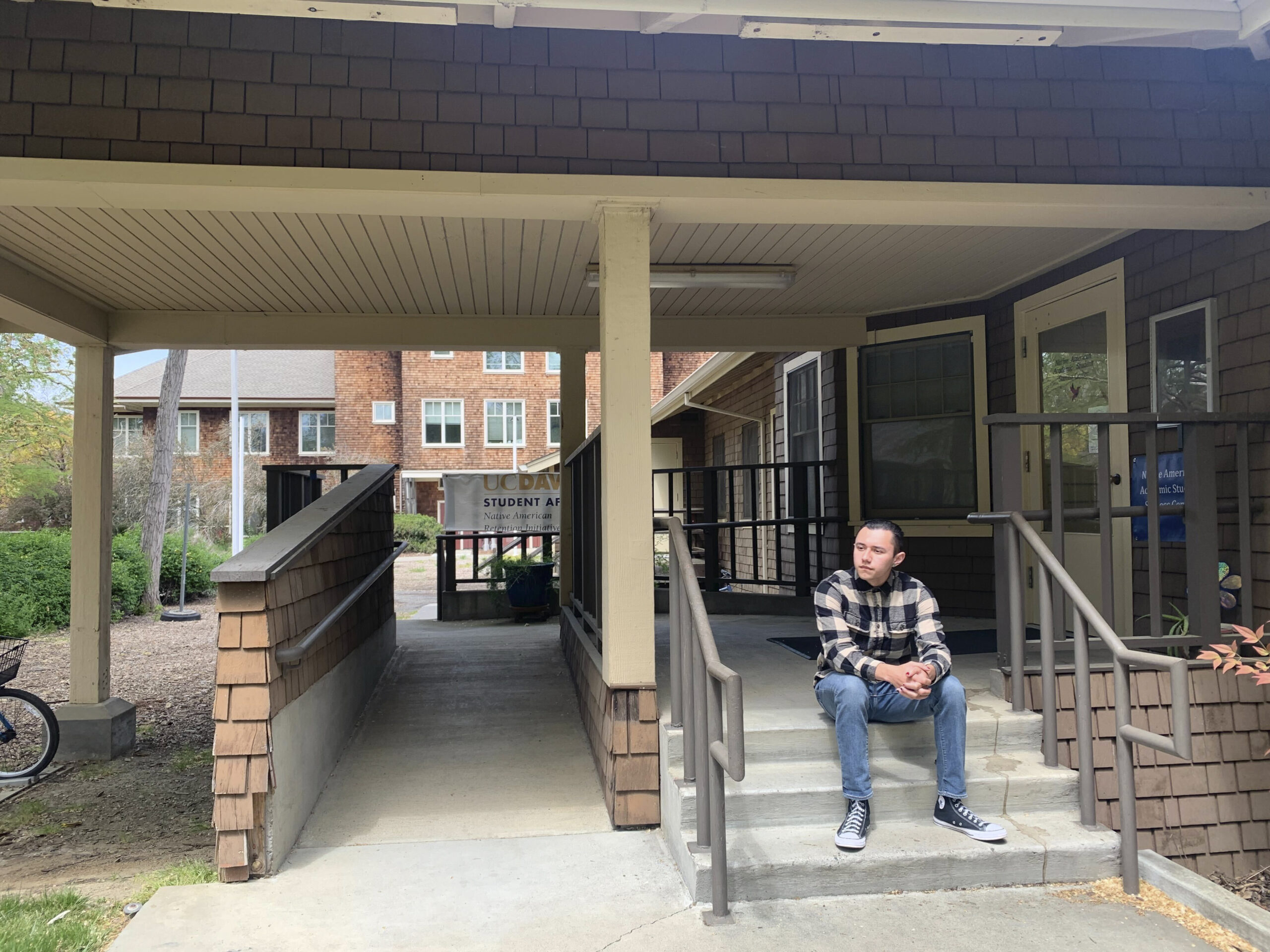
Rene Chavez sits on the steps of the Native American Academic Student Success Center, also known as the Native Nest at the University of California, Davis, on April 17, 2023. Chavez, a citizen of the Cherokee Nation, said the center is a home to him.
EMMA HALL / NEXTGENRADIO
That’s why when he got to campus he immediately sought out a community, and a place where he could truly belong. He found it at the Native Nest, the Native American Academic Student Success Resource Center at UC Davis.
“Having a whole environment where I feel really comfortable or like home is new to me,” he said.
Chavez said he often felt like he didn’t fit in with either of his communities growing up. Alongside being Cherokee, he is also Salvadoran. With that comes mixed feelings about his ethnic identity. He said he felt torn between two worlds.
“Growing up, I definitely had to kind of pick between the two sides. I kind of struggled a little bit internally,” he said. “I just felt like, ‘Okay, do I have to pick a side? Am I more of this side or more of this one?’”
However, at the Nest he found other mixed Native students like him, who understand the complexities of being mixed.
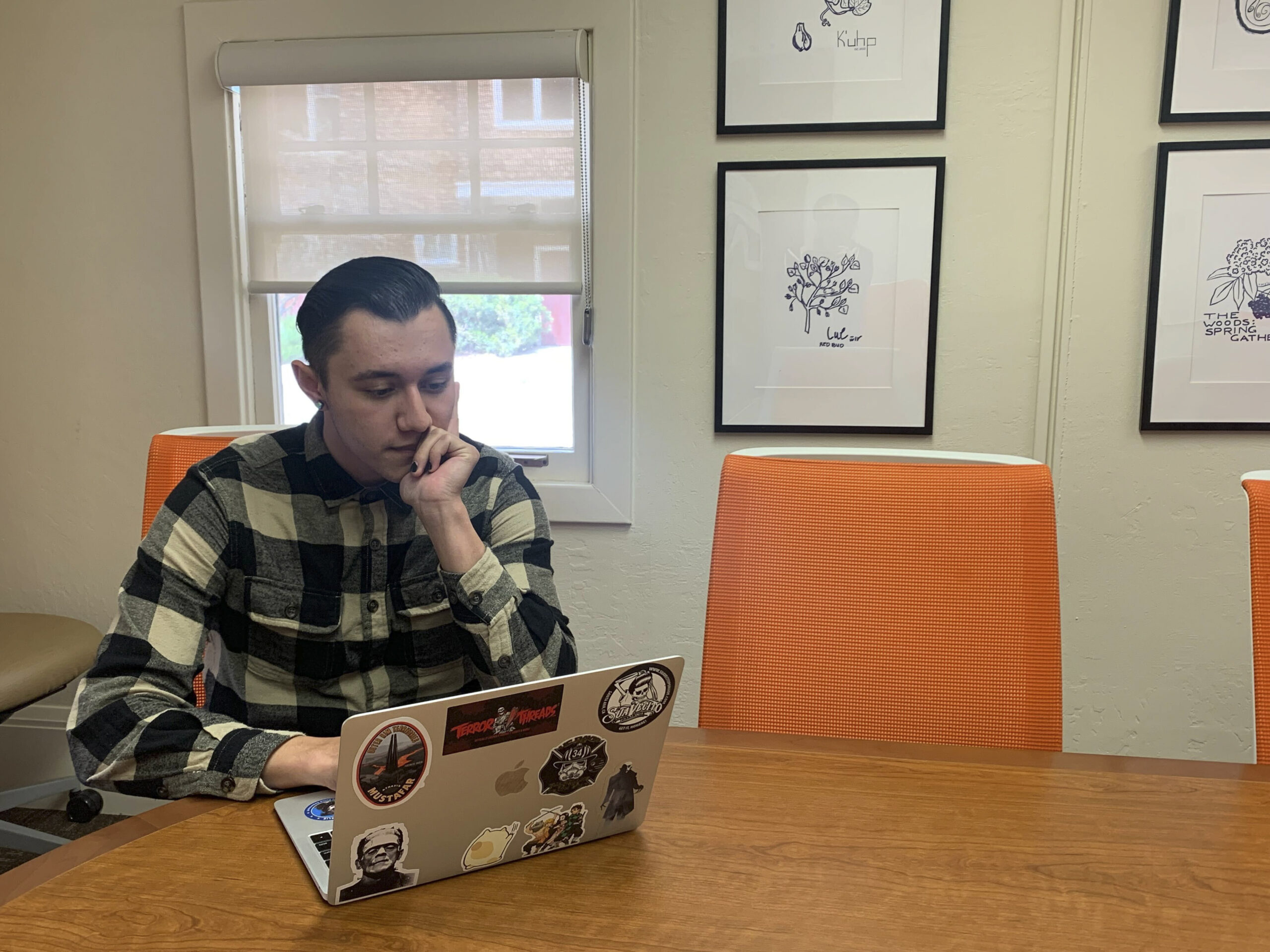
Rene Chavez, a third year biology major at the University of California, Davis, studies inside one of the rooms at the Native American Academic Student Success Center on April 17, 2023. Chavez has worked for the center for two years as a student assistant and said the friends he’s made from the center are like his family.
EMMA HALL / NEXTGENRADIO
“I can relate with them more,” he said. “I feel more comfortable being here and having a community I can rely on.”
The building itself is also a space of comfort for Chavez. It’s inside a beige house. There are counselors, study rooms, and a lounge for any and all Native students at UC Davis. On one of the walls is a mural of the Americas, where students can place push pins on the region their people are from.
The Native community at Davis is a small, but close one. American Indian and Alaska Native students enrolled at UC Davis make up at least 2% of the undergraduate population according to the university’s student ethnic demographics.
But in the Native Nest, everyone feels like they belong.
“My life is a lot better when I can actually make connections with people and see them every day,” he said.
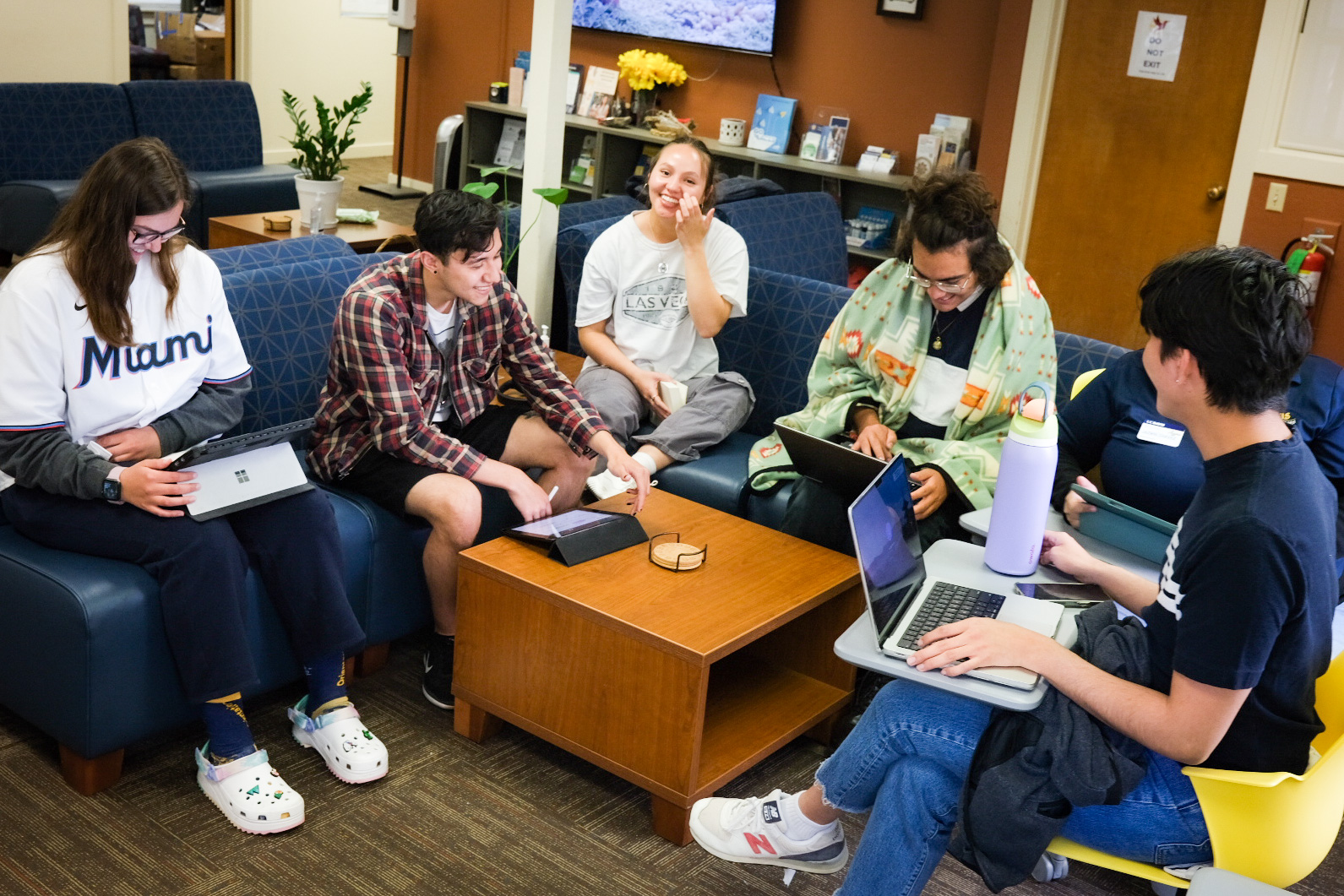
Chavez (second from left) and other students talk and laugh together in the lounge at the Native Nest at the University of California, Davis. The Nest is a resource center for both undergraduate and graduate Indigenous students at UC Davis.
COURTESY OF ADRIANA MARTIN
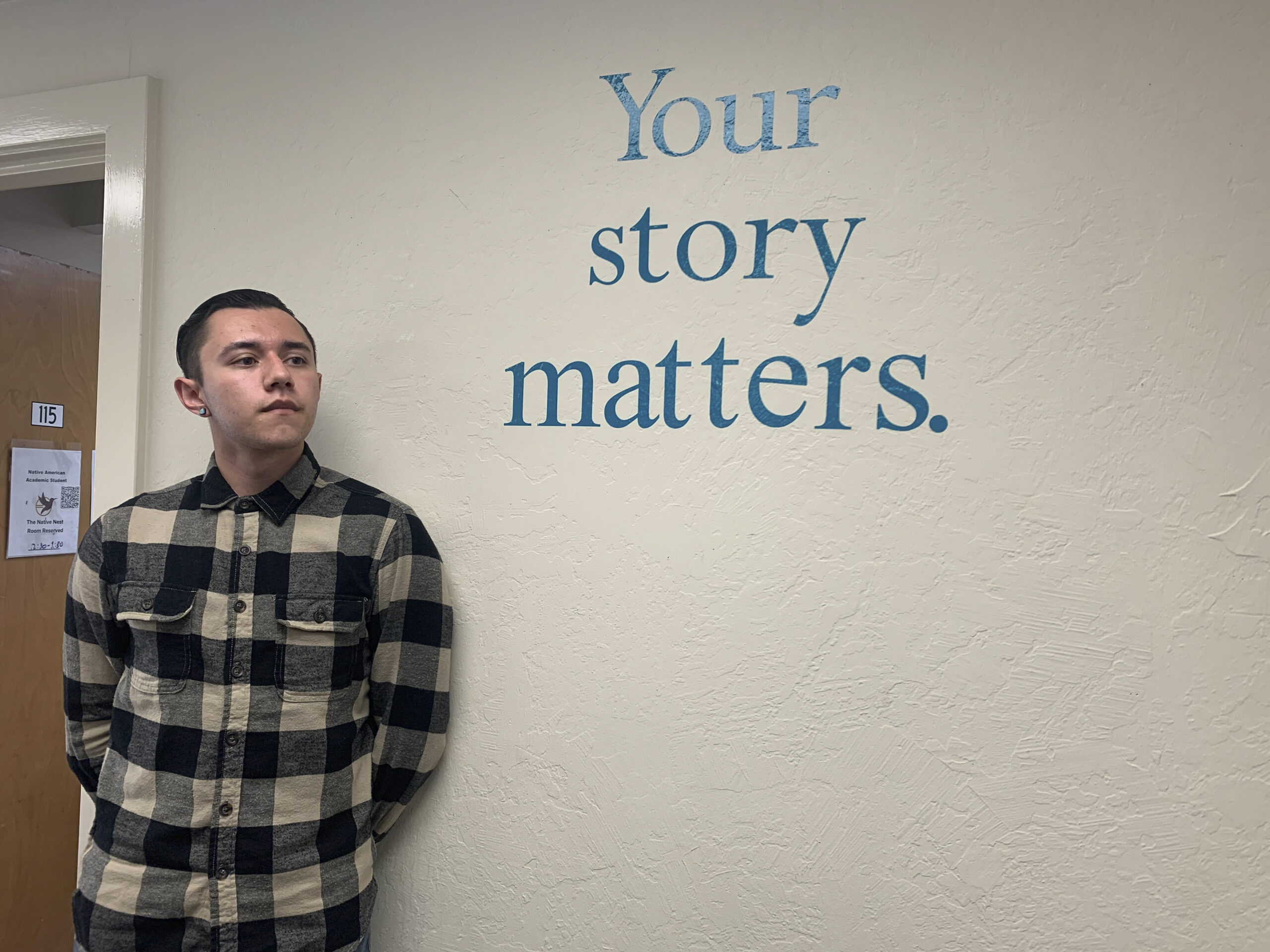
Rene Chavez, a third-year biology major stands in front of the painted phrase “your story matters” in the Native American Academic Student Success Center at the University of California, Davis, on April 17, 2023. Renee said while the Native community at Davis is small, they are close and like family.
EMMA HALL / NEXTGENRADIO
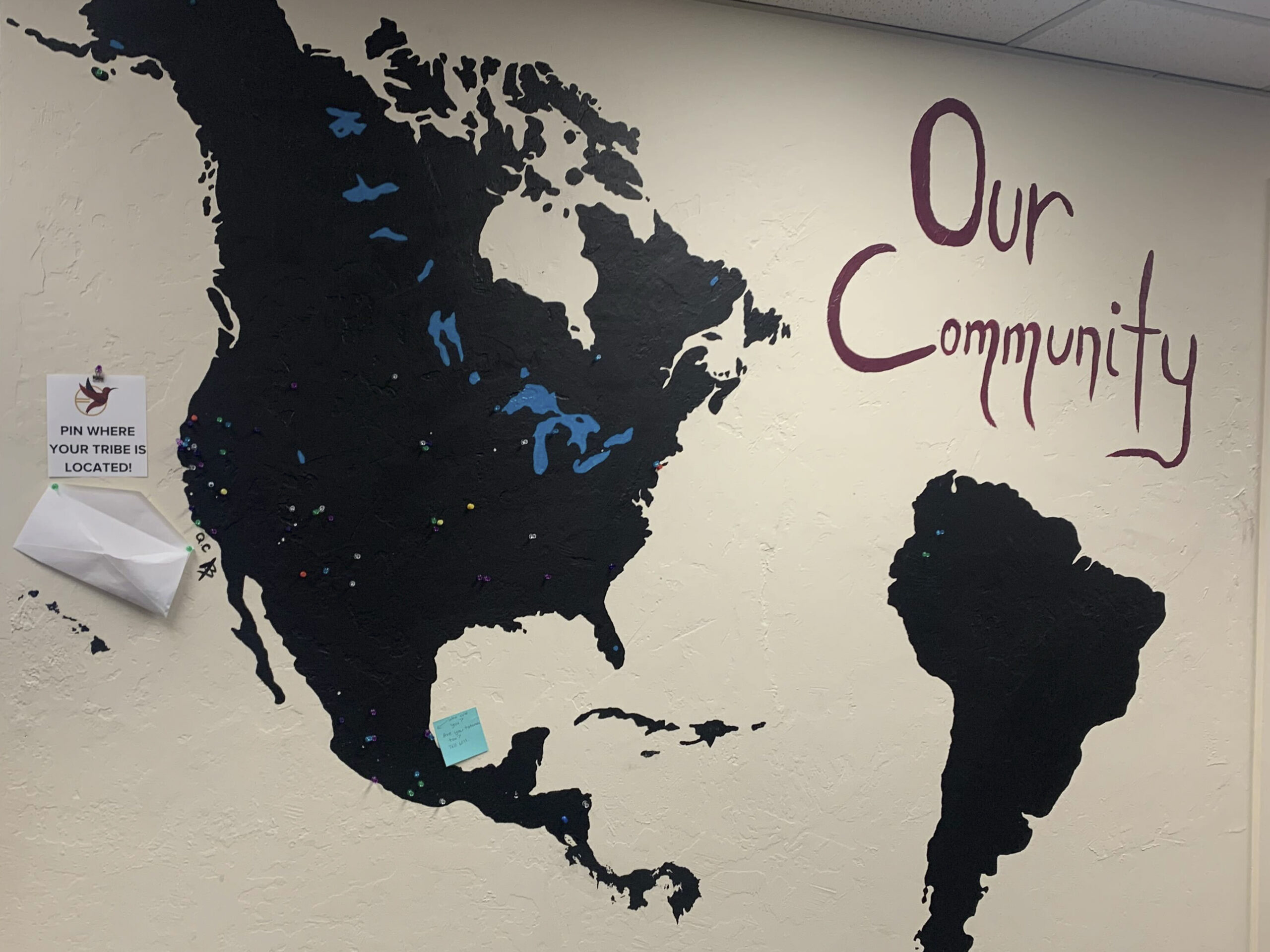
A mural inside the Native American Academic Student Success Center at the University of California, Davis, on April 17, 2023. Commonly known as The Native Nest, this mural encourages students to mark the location their tribes or people are from.
EMMA HALL / NEXTGENRADIO
During his birthday last year, Chavez had COVID-19 and was forced to quarantine. However, back at the Nest, his peers had gotten him a birthday cake, not knowing he was stuck sick at home.
“I was like, ‘Oh, wow! Okay, this is kind of like a little family for me here,” he said.
What makes Chavez feel more at home are the Nest’s traditions. For example, on the first Wednesday of every month, the Native Nest holds Waffle Wednesdays, Chavez’s favorite day.
“There are Star Wars pancakes,” he said. “I love Star Wars.”
While chowing down on waffles to start their mornings, students will typically talk and be together as a community.
Students also watch a livestream of an eagle cam on a TV in their community lounge, where Chavez said they’re diligently following the hatching of baby eagles. The students also stream other animals like squirrels and otters.
“We always have some critter cam on,” Chavez said.
While the community at the Nest has helped Chavez with financial aid and academic counseling, it has also supported him with his mental health. He said many of his peers reaffirmed to him that he isn’t alone.
“I do struggle, but so does everyone else,” he said. “So we all just keep trying and the Center just helps me feel a bit more at ease here.”
“My life is a lot better when I can actually make connections with people and see them every day.”